Forbidden Broadway: Behind the Mylar Curtain (21 page)
Read Forbidden Broadway: Behind the Mylar Curtain Online
Authors: Gerard Alessandrini,Michael Portantiere

'I'o give you an idea of how inactive Broadway was at the time, we had to look to a revival
of The Music Man that Dick Van Dyke did at City Center. So I wrote a number called "Ya
Got Trouble in New York City," about the lack of exciting entertainment on Broadway.
More and more theatre was being imported from London to fill in the void. The
Royal Shakespeare Company bought over several excellent productions that were the
talk of the town. This gave me a wonderful opportunity to steal
some more songs from My Fair Lady. We turned "The Ascot Gavotte" on its ear by dancing "The RSC Gavotte." I've always found
it a joy to parody Lerner and Loewe songs, because the lyrics are
so sharp and witty, and Alan Jay Lerner clearly lays out where the
punch-lines should be. As for Frederick Loewe's music, it's heady
and infectious to say the least, and it even sounds headier with
silly parody lyrics.
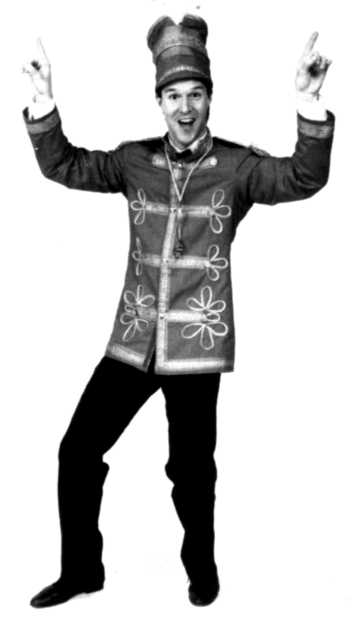
Ron Bohmer as "The Music Man" in 1986.
Our cast performed the gavotte absolutely deadpan, and ten
times snobbier than any Anglophile. I enjoyed that numberespecially the night when Mr. Lerner himself attended the show
and laughed and laughed. About six weeks later, I heard that he
had died from cancer, and I realized what a great compliment
he had paid us: Forbidden Broadway must have been one of the
last shows he chose to attend.
Although it was a very quiet time on Broadway, the Upper
West Side was gentrifying, and our show was doing very well.
When we did a new edition, we'd get a huge amount of attention
from the press, partly because there was almost nothing else going on. We couldn't really spoof shows like Quilters or Starmites,
because they didn't run long enough for people to get to know
the music.
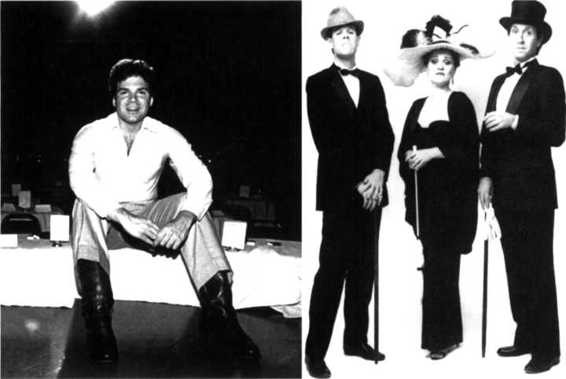
Left: Gerard at a rehearsal in the mid-'80s. "These boots are made for walkin' over people's careers!"
Right: Craig Wells, Nora Mae Lyng, and John Vandertholen do the "RSC Gavotte."
Artistically, Broadway was hanging on by two threads: Jerry Herman and Stephen
Sondheim, giants from the golden age who were still turning out musical theatre
gems. La Cage aux Folles and Sunday in the Park with George had opened in the same
season and went head to head against each other for the big awards. La Cage won the
Tony, but Sunday won a Pulitzer Prize. This rivalry did not go unnoticed at Forbidden
Broadway.
Although I personally thought George Hearn's performance in La Cage was stellar,
I couldn't help turning "I Am What I Am" into "I Ham What I Ham." I knew it was an
easy jab and not a very clever turn of phrase, but there are some parody titles I just
can't resist. Certainly, I enjoyed the gales of laughter that the number earned every
night. And it was great fun to see the super-talented hams of our own companyPatrick Quinn, and later Herndon Lackey and Craig Wells-going way over the top
themselves.
As for Sunday in the Park with George, I avoided ribbing Mandy Patinkin and Bernadette Peters specifically. (In my heart of hearts, I must have deeply regretted this,
because I tortured them relentlessly in later years.) But Sondheim was such a force
in this era that it seemed appropriate to make him the subject of ridicule. Forbidden
Broadway had previously had a spoof called "Too Many Sondheims." In that version,
our genius pianist/musical director Fred Barton performed the number, bemoaning
the many young musical theatre writers who imitated Sondheim. Now I created a little parody that had Steve himself bemoaning his lack of mass appeal. The title for
that seemed obvious: "Send in the Crowds."
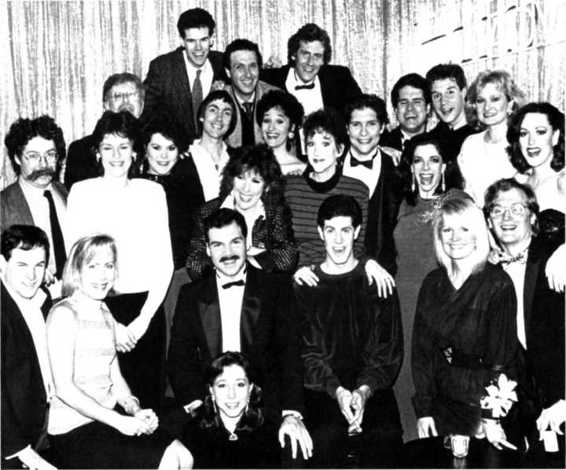
The Forbidden Broadway company (including Jason Alexander, far left in bottom row) celebrates the show's fifth
anniversary.
The first time Sondheim attended Forbidden Broadway, he told me he felt that my
parody lyric about him was "kind and gentle." I took that to mean I should be sharper
and funnier. Years later, after he had seen our other spoofs of him and his work, he
told me with a twinkle in his eye that he regretted what he had initially said because,
ever after, I had "mercilessly slashed" him. He also once advised me, "The meaner,
the funnier"-but I was never sure if he meant I should be meaner to him or to the
likes of John Stamos. In any case, I'm mean to everybody, so the bases are covered. I
hope you're happy, Steve!
Of course, Sondheim wasn't the only contemporary musical theatre writer I lambasted. Right from the start, Andrew Lloyd Webber was a fun target. When Fred Barton left Forbidden Broadway to do the Zorba tour with Anthony Quinn, his excellent replacement was Mark Mitchell-a superb musical
director who didn't look anything like Sondheim.
One day at rehearsal, I was staring at Mark's profile
and thinking, "Who does he look like?" Suddenly,
it occurred to me: Andrew Lloyd Webber! (Not Sir
Andrew; he hadn't been knighted yet.)
I must have said this aloud, because Roxie Lucas
screamed, "Yes! Yes!" She found a graduation robe
in the dressing room and got Mark into it. Roxie
and I looked at each other and exclaimed, "Lloyd
Webber's Mass!" So, for nearly a year, we said high
mass at Forbidden Broadway every night-Cats,
Evita, and Joseph-style.
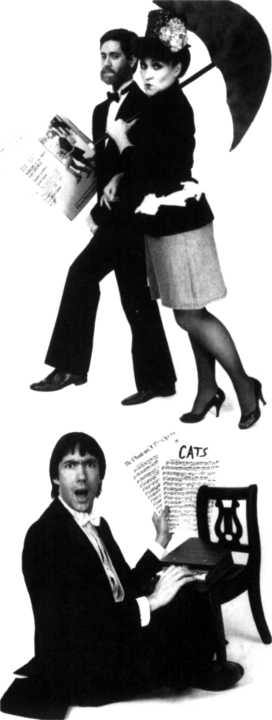
Above: Fred "Sondheim" Barton and Nora Mae
"Bernadette" Lyng. Below: Mark Mitchell as
"Andrew Lloyd Superstar."
Many people ask me if Lloyd Webber himself is
put off by Forbidden Broadway. I suppose they assume that's the case because it seems as though he
would be the easily offended British type. In fact,
I find he has a wonderful sense of humor; he has
seen the show more than once and has always been
delightful to me, full of fun stories and Forbidden
Broadway-like observances about theatre in New
York and London.
Thinking it through, it occurs to me that Andrew
Lloyd Webber and Stephen Sondheim can afford to
be big about their parodies because they are secure
in their art and they clearly know what they're doing. Nothing I could say in Forbidden Broadway
can shake that basic foundation. I also think both
men are intelligent enough to understand that I
have the greatest admiration for writers and know
that the most important ingredient for theatrical
success is a brilliant score.
The summer of 1986 was the first time we did
a "Summer Shock" edition of Forbidden Broadway. We introduced Barbra Streisand to the show,
because her Broadway Album had recently been
released. One Broadway musical that gave us a lot
of mileage was Singin' in the Rain; even though it was an also-ran, everybody knew
the songs from the movie. So we did a number called "Spinnin' Down the Drain," and
another one called "You Are My Yucky Star." The finale was a ballet featuring Twyla Tharp as a neo-Nazi in a tutu and running shoes; to the tune of "Broadway Melody,"
the cast wailed, "That's the Broadway malady!"
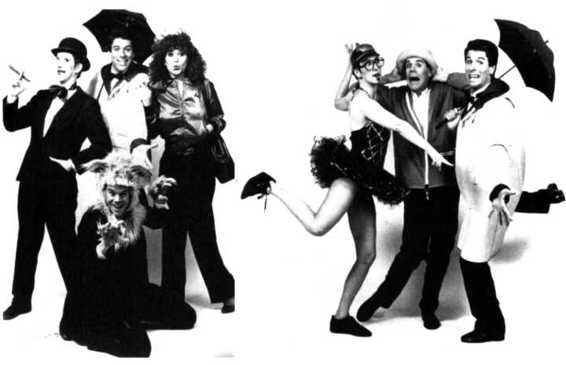
Left: The 1986 cast: Roxie Lucas (as Edwin Rude), Mark Martino (as Don Correia), Susan Terry (as Bernadette
Peters), and Craig Wells (as Rum-Dum-Tugger). Right: Roxie Lucas (as our fantasy version of Twyla Tharp), Craig
Wells (singing "Make'Em Leave"), and Mark Martino go "Spinnin' Down the Drain."
